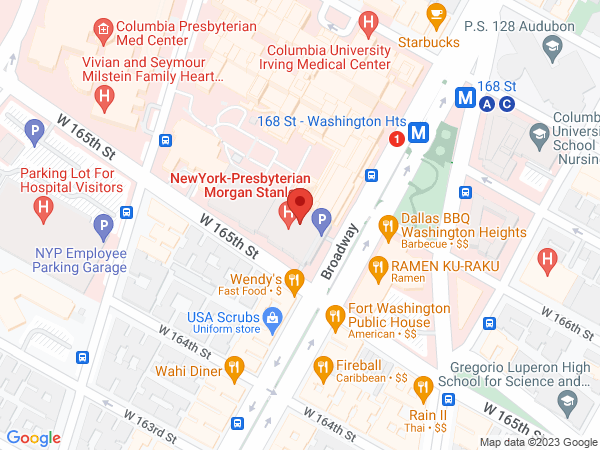Lysosomal Storage Disease Program
Make an Appointment
Our team is here to help you make an appointment with the specialists that you need. Click Request an Appointment to email our specialists, or click Find a Doctor for a list of physicians who treat Lysosomal Storage Disease.
If you or your child has a lysosomal storage disorder (LSD), finding a care team whose members are experienced in identifying and treating these rare conditions can make all the difference. LSDs often require active management and ongoing care, so it’s critical to work with experts who understand your child’s condition and how to treat it. The ColumbiaDoctors Lysosomal Storage Disease Program provides exceptional comprehensive care to children and adults with lysosomal storage disorders (LSDs).
What are Lysosomal Storage Disorders?
Lysosomal storage disorders are inherited diseases in which a genetic mutation causes the body to produce low levels of certain enzymes and proteins that break down or “digest” complex substances inside cells into simpler components. When there’s not enough of a specific enzyme, these complex substances accumulate in cells and organs in toxic amounts, causing damage and dysfunction. Many LSDs are diagnosed in early childhood, but they can also begin to show signs and symptoms at any age.
Over 60 different LSDs have been identified to date. Each lysosomal storage disorder is linked to a mutation in a specific gene containing the information cells need to produce a lysosomal enzyme; these proteins are key to maintaining cellular activity in different organs or body parts—the skeleton, brain, skin, heart, or central nervous system, for example. So LSDs can have widely varied symptoms depending on the organ affected.
LSDs are individually rare but, as a group, are common. Since newborn screening for LSDs expanded in the last 10 years, the numbers of those diagnosed with these conditions has increased dramatically. There have also been tremendous advances in understanding and treating LSDs, and related improvements in patients’ quality of life.
Expertise That Makes a Difference
At Columbia University Irving Medical Center, members of our LSD Program are among the most experienced in the nation with these complex disorders. Our team includes a board-certified biochemical geneticist, nurse practitioner, dedicated genetic counselor, metabolic dietitian, and social worker. Through our dedicated research lab focused on the disease mechanisms of LSDs, our team is making advances in understanding and treating this group of complex disorders. And our in-house biochemical laboratory performs very specialized tests that are key to diagnosing and managing patients with LSDs.
Comprehensive Care Across All Specialties
Because LSDs affect many parts of the body, it’s important to have experts from different fields on your team. Our program combines the resources and expertise of a major academic medical center and one of the leading children’s hospitals in New York City. As part of NewYork-Presbyterian Morgan Stanley Children’s Hospital, we work closely with many colleagues across different pediatric specialties to provide compassionate, comprehensive care for you and your child.
Treatment Driven by the Latest Research
Diagnosing and treating LSDs early, before organ damage occurs, is fundamental to improving or maintaining your child’s quality of life. Our LSD team is led by a physician-scientist who is a national and international leader in research focused on developing new therapies and understanding fundamental aspects of the disease to improve the diagnosis and management of patients. Our specialists offer advanced treatments based on the latest evidence-based research, including clinical trials for genetic testing and therapeutic optimization.
Family-Centered Support
We understand how difficult living with these disorders can be—and how these challenges can affect your entire family. Our team is ready to help support your child and your family in every way. Our goal is to keep you or your child, as well as your family, healthy.
Conditions We Treat
- Gaucher disease
- Tay-Sachs disease
- Fabry disease
- Niemann-Pick disease
- Pompe disease
- Krabbe disease
- Metachromatic leukodystrophy (MLD)
- Niemann-Pick C disease
- Acid sphingomyelinase deficiency
- GM1 gangliosidosis
- Mucopolysaccharidosis (Hurler disease, Hunter disease, Sanfilippo disease, Morquio disease)
- Neuronal ceroid lipofuscinosis
- Cholesteryl ester storage disease and Wolman’s disease
- Batten disease
Our Team
- Gustavo Maegawa, MD, PhD, FACMG
LSD Specialist - Andrew Shawhan, MS, MPH, CPNP-PC
Nurse Practitioner - Nora Nesheiwat, MS, CGC
Genetic Counselor - Diana M. Cory, MS Ed, MSW, LCSW
Social Worker
Contact Us
Call 212-305-6731 or email us at peds_genetics@cumc.columbia.edu.
